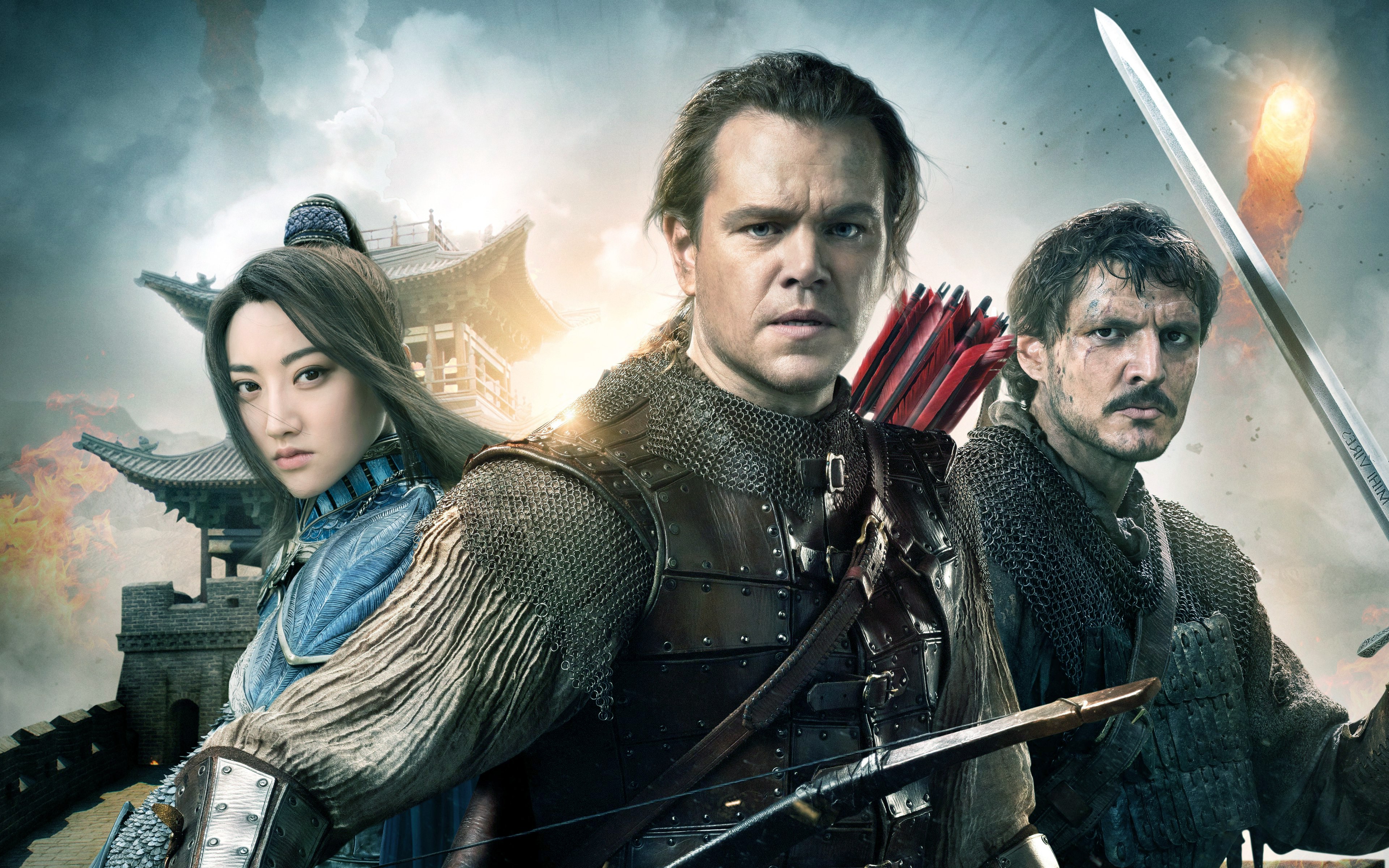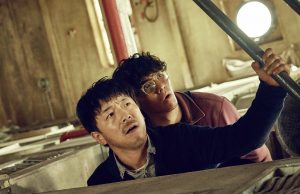Every day while CFI’s Hollywood readers take in the business of the Chinese film industry, the actual movies can sometimes seem exotic or remote. But in major US cities, mainstream Chinese films are increasingly available: thanks to Wanda’s purchase of AMC and distributors like China Lion, they get American theatrical releases practically simultaneous to their premieres at home. Though they receive virtually no publicity outside the non-Chinese community, these films are more than worth seeking out by anyone serious about engaging the Chinese industry, understanding the Chinese sensibility and familiarizing themselves with China’s talent pool. Periodically, CFI will review and point readers in the direction of noteworthy US releases of contemporary commercial and independent Chinese titles.

The Great Wall (2016), story by Max Brooks, Edward Zwick & Marshall Hershkovitz; screenplay by Carlo Bernard & Doug Miro, Tony Gilroy; directed by Zhang Yimou
Distributed by Universal Pictures (cinemas here)
Grade: B+
The first coproduction between China and the US directed by an A-list auteur from either country, Zhang Yimou’s The Great Wall was long anticipated, and then anticlimactic once its Chinese run last December failed to attain the record-breaking earnings necessary to justify its megabudget cost. Arriving in the US this past weekend and earning some US $21.5 million as of Tuesday morning, the hybrid monster movie/war epic is a curious specimen, representing Zhang at both his best and worst.
Visually, it’s nearly as stunning in scale and scope as the 66-year-old director’s design of the 2008 Beijing Olympics opening ceremonies, presenting a crisp parade of striking costumes, beautiful production design, mist-shrouded desert landscapes, rousing battle sequences and lightning flashes of deep, resonant color inside its muted palette.
From a script originally hatched by producer Thomas Tull (reportedly an old fashioned fantasy/monster movie fanboy), and subsequently labored over by a succession of high-paid Hollywood pros to feature the adventures of wandering Euro-mercenaries in Song Dynasty (11th-Century) China, Zhang has created a vehicle to spotlight China as the source of military might and moral right, from an overwhelming number of troops with unshakable loyalty to their emperor, to the magical black powder that “turns air into fire” and the fortitude to use that powder only for good.
It’s the hunt for gunpowder—a 9th century Chinese discovery—that draws the stateless Anglo soldier-of-fortune, William (Matt Damon) into conflict with a Chinese army stationed atop the titular massive wall built to defend their capital against a mysterious enemy. William and Tovar, his axe-wielding Spanish sidekick (Pedro Pascal) have wandered the desert in search of the storied black powder, hoping to plunder some and return to Europe to retire rich.
Narrowly escaping attack by an unseen beast, they sever its giant green reptilian claw in the shadows beyond their campire’s glow. The next day, when forced to surrender to the Chinese garrison, they present the monster limb to their captors— a boastful distraction from the lie that they are but humble traders who got lucky with their weapons.
William and Tovar speak no Chinese, so it is the beautiful lady Commander Lin (Jing Tian) who translates for them, explaining that the claw heralds the arrival of the Taotie, a horde of scaly, emerald-colored, dinosaur-dragon-lizard creatures that appear every sixty years in search of human flesh to feed their elephant-sized queen—a punishing reminder to the Chinese emperor never to take his earthly dominion for granted.
Burly but fleet, the beasts attack by the thousands, counterposing sharp fangs, state-of-the-art special effects and Zhang’s sweeping compositions, surveying huge crowds in action. William and Tovar shine, too, saving a young Chinese soldier and gaining their captors’ trust as the battle rages on—a trust Tovar shatters when he flees the fight with black powder that he steals with the help of a sniveling Anglo captive (Willem Dafoe).
Predictably, after declaring their differences, William and Lin end up flirting and saving the day together. (“Perhaps we were both wrong. We are more similar than I thought,” she says). He sets her up for the kill shot and they drink from the same humble cup. The disciplined and selfless Chinese commander and the unruly and egotistical Western mercenary need each other. To those who slighted Zhang for casting Damon as a white knight, consider trying to see The Great Wall for what it is: a Chinese film with Hollywood characteristics trying to earn some cheddar selling the age-old message about the need to overcome differences to beat a common enemy.
That the transpacific movie business today is one of the few relative bright spots in a widening climate of distrust between Washington and Beijing could not have been lost on Zhang’s backers, both Chinese and American. Damon’s leading role could help sugarcoat for the American heartland that the U.S. needs to trust China and get along in global trade (and against North Korea and radical Islam). Or, if, for once, Damon’s star power fizzles at American cinemas, then The Great Wall will have failed at what feels like its core project: to become the first Hollywood-grade Chinese propaganda film.
Which, you know, cool. But also, not really. Because it is precisely this aspect of Zhang’s enterprise that rankles—more than the half-baked characterization of any of the Chinese roles (despite providing facetime to luminaries including Andy Lau, Eddie Peng and Zhang Hanyu, as well as recently minted idols like Lu Han and Karry Wang Jukai), more than the discrepancy between Jing Tian’s emoting in Chinese (pretty good) and English (girl needs a way better dialogue coach), more than Zhang’s greatest-hits reprise of bits from Hero and the Olympics opening ceremonies, and more than the deep dopiness of a scheme that pits a serious military force against an army of opponents with reptile intelligence, it is the film’s weakest link.
Those with some knowledge about Zhang’s early career as a pioneering Fifth Generation director, making stunning, introspective films about common, individual Chinese struggling against injustice (Red Sorghum, Raise the Red Lantern, Ju Dou, The Story of Qiu Ju, To Live), may wonder what he’s up to with this stuff, and the answer would begin in 1997, with the government’s suppression of a contemporary black comedy, Keep Cool (It was withdrawn from its competition slot at the Cannes Film Festival before it had a chance to show, subject to recuts including the imposition of a happy ending, and little seen in China).
A few years later, when Zhang made Hero, Western audiences were stunned by its cinematic elegance, bold color sense, thrilling widescreen battle scenes, and Kung Fu and swordfight choreography designed to one-up that of Crouching Tiger, Hidden Dragon. Chinese intellectuals, however, saw its story of an emperor’s strength in the face of revolt as an apologia for the government’s actions at Tiananmen Square, and noted that its philosophical catchphrase, tianxia (all under heaven) happened to be the same language used by the Communist Party with regard to China’s claim on Taiwan.
Since that time, Zhang has been almost a kind of Jeckyll-and-Hyde filmmaker, capable of fantastic, aestheticized entertainments (House of Flying Daggers), and smaller, grittier dramas (Riding Alone for Thousands of Miles, A Woman, A Gun, and a Noodle Shop), but also films seemingly conceived to present a particular image of China and its rulers to the rest of the world (Curse of the Golden Flower, Under the Hawthorn Tree, Coming Home)—these were achieved so skillfully as to secure him the Olympics job, orchestrating thousands of dancers and performers and detonating tons of fireworks to conjure 5,000 years of Chinese culture for the entire world, a presentation that it is certain many more Americans know him for than any of his films.
Ramping up these outward-facing efforts in cinema, Zhang subsequently made The Flowers of War, about Japan’s atrocities in Nanjing in 1937. The director and his American co-producers enlisted Christian Bale to play an unlikely savior of downtrodden Chinese, but even Bale’s star power could not prevent the film from wilting on both sides of the Pacific.
With The Great Wall, Zhang, driven as ever, has tried again, and this time, with the flimsiest of B-movie scenarios, has managed to come near to achieving the elusive transpacific China-meets-Hollywood ideal. What remains to be seen is whether Western stars on the order of Matt Damon can continue to be recruited to sell a superpower other than America at the core of the films they’re starring in, whether mainstream US audiences can also accept Asians as heroes (especially if their pronouncements about greatness need to be read in subtitles), and whether government messages can ever be dropped in favor of the compelling human drama that made Zhang’s name in the first place.
WHAT DOES THE GRADE MEAN?
Here are some recent & modern-era vintage Chinese and Hong Kong films for comparison
- A+
- PLATFORM (2000, dir Jia Zhangke)
- THE WORLD (2004, dir. Jia Zhangke)
- DRUNKEN MASTER 2 (1994, dir. Lau Kar Leung & Jackie Chan)
- KUNG FU HUSTLE (2004, dir. Stephen Chow)
- A
- LET THE BULLETS FLY (2010, dir Jiang Wen)
- THE MERMAID (2016, dir. Stephen Chow)
- A TOUCH OF SIN (2013, dir. Jia Zhangke)
- STILL LIFE (2006, dir. Jia Zhangke)
- MOUNTAINS MAY DEPART (2015, dir. Jia Zhangke)
- LITTLE BIG SOLDIER (2010, dir. Ding Sheng)
- EXTRAORDINARY MISSION (2017, dir. Alan Mak & Anthony Pun)
- MR SIX (2015, dir. Guan Hu)
- A WORLD WITHOUT THIEVES (2004, dir. Feng Xiaogang)
- SUZHOU RIVER (1999, dir. Lou Ye)
- HOUSE OF FLYING DAGGERS (2004, dir Zhang Yimou)
- RAISE THE RED LANTERN (1991, dir. Zhang Yimou)
- A-
- DUCKWEED (2017, dir. Han Han)
- I BELONGED TO YOU (2016, dir. Zhang Yibai)
- B+
- THE GREAT WALL (2016, dir. Zhang Yimou)
- OLD STONE (2016, dir. Johnny Ma)
- CRAZY STONE (2006, dir. Ning Hao)
- GO, LALA GO (2010, dir. Xu Jinglei)
- B
- KUNG FU YOGA (2017, dir. Stanley Tong)
- RAILROAD TIGERS (2016, dir. Ding Sheng)
- THE WASTED TIMES (2016, dir. Cheng Er)
- CHONGQING HOT POT (2016, dir. Yang Qing)
- MONSTER HUNT (2015, dir. Raman Hui)
- B-
- JOURNEY TO THE WEST: THE DEMONS STRIKE BACK (2017, dir. Tsui Hark)
- SOME LIKE IT HOT (2017, dir. Song Xiaofei & Dong Xu)
- BORN IN CHINA (2016, dir. Lu Chuan)
- D-
- TINY TIMES (2013, dir. Guo Jingming)





